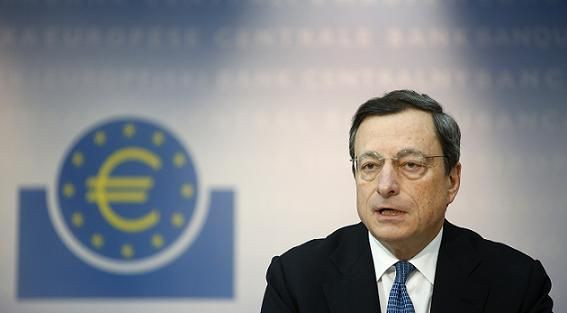ECB To Hold Fire At February Meeting; Could Risk Losing Out Amid A Currency War

The European Central Bank is expected to keep interest rates on hold at 0.75 percent on Thursday, refraining from cutting them further as the euro zone economy shows fledgling signs of life. Meanwhile, economists warn that at a time when other central banks are continuing to print money, leading to weaker currencies, the ECB may risk losing out in a currency war as it seems to be heading in the opposite direction.
The ECB’s monthly policy statement will be released on Feb. 7, followed by a press conference that starts at 1:30 p.m. London time (8:30 a.m. EST). The unanimous verdict of economists polled by Reuters is that the ECB will not change its stance this month.
“Last month the ECB signaled a sense of satisfaction that financial market tensions had eased considerably and that funding conditions for both banks and sovereigns had shown signs of a marked improvement,” said James Nixon, an economist at Societe Generale, in a note to clients.
The few Governing Council members who wished to cut interest rates last month no longer felt that such a move was necessary, and the decision to keep rates on hold was unanimous.
“In doing so, the ECB appeared to close the door to future rate cuts,” Nixon said.
The European Commission’s business and consumer survey indicators for the euro area continued their recovery in early 2013, adding to evidence that the economy is on the mend. Forward-looking indicators such as production and export expectations are improving markedly and driving the recovery in overall sentiment.
However, while the recent improvement in the business and consumer surveys is an encouraging sign for the future, they remain at very low levels for now. The PMI survey points to quarterly falls in GDP of about 0.3 percent and the EC ESI is consistent with an annual contraction of about 2 percent.
“This is much worse than the picture painted by similar surveys for other major economies,” Capital Economics economist Jennifer McKeown said in a note to clients. “Indeed, the euro zone PMI remains at a level that, in the past, might have prompted interest rate cuts.”
If the surveys continue to improve, then it will not be long before they are consistent with renewed growth. But it should be noted that the previous improvement in the business surveys seen one year ago was quite quickly reversed.
Ben May, a Europe economist at Capital Economics, said in a note: “The Bank’s faith that improving financial market conditions will soon generate economic growth might prove to be misplaced. And with other central banks still upping their support, the ECB risks losing out in a currency war.”
The debate on currency wars, which reached a climax in 2009 when the Federal Reserve launched its first quantitative easing, or QE, has been revived by Japanese talk of loosening monetary policy further. Among the Bank of Japan, the Bank of England and the Fed, the ECB actually stands out for not signaling any desire to undertake further monetary loosening.
Rather, banks have started to repay some of the long-term refinancing operation's money.
The repayment by banks of €137 billion ($184.3 billion) of LTROs to the ECB -- shrinking its balance sheet in contrast to further expansion elsewhere -- has proved a to be a catalyst for euro strength.
“This has added to the feeling that the ECB’s monetary stance is getting tighter rather than looser, even though the ECB has not changed its stance,” Ruben Segura-Cayuela and Laurence Boone, London-based Bank of America Merrill Lynch economists, wrote in a note to clients.
As a result, fears of a rising euro have increased. The 17-nation currency has risen to a 14-month peak against the dollar and a 30-month high against the yen.
“If questioned about this, President Mario Draghi is likely to state that the LTROs were always supposed to be temporary in nature and that their repayment is an encouraging sign that conditions in the euro zone are normalizing,” McKeown said. “But while that is true, it is clear that the improvement in financial markets is not yet being felt in the wider economy and the ECB’s inaction could spark a further appreciation of the euro exchange rate, which will damage the region’s economic performance even more.”
© Copyright IBTimes 2024. All rights reserved.






















